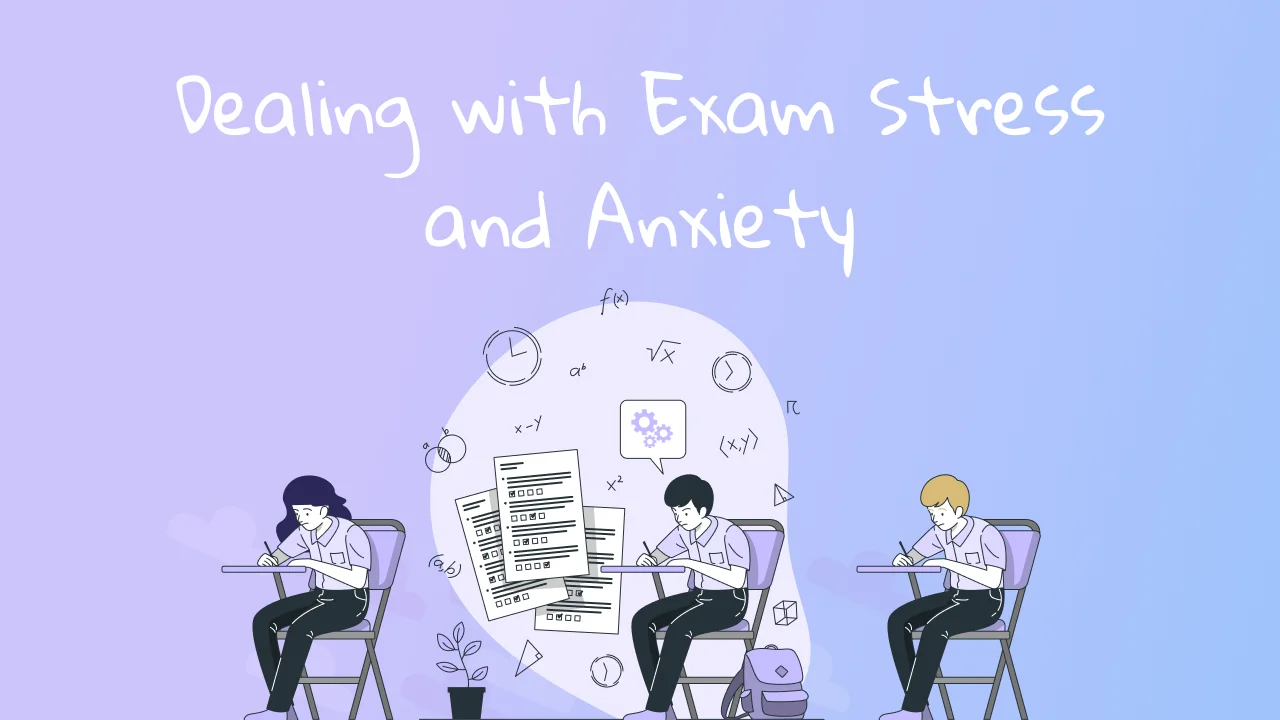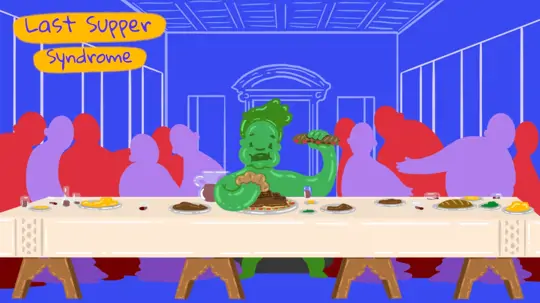
Start feeling better today!
Connect with your therapist today and take control of your life like our 850.000 happy clients.
Get StartedHow to Cope with Test Anxiety and Exam Stress
You have an important exam coming up in a few days. As you consider the exam, you become aware of a nagging pain in your stomach. You can feel your muscles tensing. You are concerned about the exam because you believe you must perform well.
Does the above story sound familiar to you? You are not alone. Let's take a closer look at test anxiety together and discover what can be done to overcome it.
What is Test Anxiety?
Exams cause a great deal of anxiety for many students. Anxiety and stress are common before exams and other important events1, 2. Test anxiety is caused by a person's fear of failing an exam3, 4. The test taker may experience varying degrees of test anxiety, ranging from being unconcerned about the exam environment to feeling anxious or panicked5.
You may experience test anxiety throughout the year, particularly during high school or university exams, which represent progress in your educational career.
Anxiety and stress, however, are not entirely negative experiences. Normal levels of anxiety and stress motivate us to take action and solve the problems we face. However, when our anxiety becomes chronic and excessive, we begin to suffer physically and mentally. This becomes a factor that prevents us from effectively applying the information we learned while preparing for the exam, lowering our exam performance.
If the test anxiety is within normal limits, the student is confident in themselves and studies for the exam, taking into account the upcoming exam's difficulties. A student who has a high level of test anxiety cannot effectively evaluate their own knowledge and capacity1.
Exam anticipation and exam anxiety are not the same thing! For a person to be motivated, some anticipation is required to feel a certain amount of tension and anxiety before the exam. The experience of a student who suffers from severe and ongoing test anxiety, on the other hand, is quite different.
Exam anxiety, a feeling of panic as the exam date approaches, an inability to work efficiently due to anxiety, or freezing and forgetting what you know during the exam are just a few examples. In this case, the student usually gives their best effort1.

What Causes Exam Stress and Test Anxiety?
According to Kirkland and Hollandsworth, test anxiety includes ways of thinking that are not directly related to the exam, such as the student's difficulties with studying1, 7.
When a person has a history of negative experiences or is subjected to negative criticism in their environment, they may gradually develop test anxiety. In addition, a failed exam grade in the past can harm a person's self-esteem and cause test anxiety1.
If a person is nervous about how the exam will go, this can have a negative impact on their success. It should not be overlooked that, in addition to being well-prepared in terms of knowledge, taking the exam with a clear mind is essential1.
What Factors Increase Exam Anxiety?
The intensity of anxiety is determined by the person's perspective and approach to the events they have witnessed. Recognizing these points of view is critical for lowering anxiety. To use one of the most common negative approaches as an example1:
Being afraid of being judged and undervalued in comparison to others
Students may believe that if they fail the exam, their worth will be diminished. Exam success may be viewed as critical to gaining their family's support and appreciation. Worrying about being judged and not being valued can have a negative impact on exam performance.
Relating exam success and happiness
During the school year, students' primary focus is on exams. Students with this level of dedication are more concerned about the exam because they believe that passing it is the only way to be successful and happy in the future.
Negative Thought Patterns That Increase Exam Anxiety
- Black and White Thinking:
- - If the student does not achieve a perfect score on the exam, they will consider themselves to be completely unsuccessful. For example, if the student believes that if they do not get the best possible grade on this exam, they should not take it at all.
- Overgeneralization:
- - When a student fails a test, they assume they have failed in all aspects of their life. For example, a student may believe they are a total failure after failing a test.
- Mental Filter:
- - It's just the student's fixation on negativity and denial of all reality. For example, a student who has a lot of homework and has friends over on weekends believes that everything bad happens to them.
- Overriding the positive:
- - For whatever reason, the student disregards positive events. For example, they may have believed that they received the highest grade in the class by chance.
- Drawing a quick conclusion:
- - Even if they lack conclusive evidence, the student has a tendency to jump to conclusions. For example, if a teacher fails to communicate with them at school, they attribute it directly to their exam grade without knowing why.
- Overestimation / Underestimation:
- -The student overestimates his own failures while underestimating his own successes. The student undervalues the mistakes of those around them while overestimating their own successes. For example, the student believes that they have no right to make mistakes. When they think of his brother, they underestimate his flaws, claiming that he, too, has flaws, but that he is young. They do not hold themselves to the same standards.
- Emotional Reasoning:
- -It is the student's negative emotional definition of reality. For example, during the day, the student attributes their bad mood to the fact that they will fail the exam.
- Should sentences:
- - The student has made commitments to themselves. For example, a student may feel obligated to pass the exam in order to maintain their family's trust.
- Labeling:
- - Labeling is the most extreme form of generalization. Based on any event, the student describes it in an emotionally charged and extreme manner. For example, if a student fails an exam, they label themselves as "useless."
- Personalization:
- - The student holds themselves responsible for the negative events that have happened. For example, a student may associate their parents' unhappiness for any reason with the failure of their own exam and blame their own exam grade for their family's unhappiness.
What are the Symptoms of Test Anxiety?
Test anxiety symptoms manifest themselves in three ways: physically, mentally, and behaviorally. Students suffering from test anxiety may experience distressing physical symptoms. Palpitations, hot flashes, shortness of breath, difficulty swallowing, chills, stomach pain, insomnia, and other symptoms are common.
Negative thoughts, feelings, and images that cause the student to panic are examples of mental symptoms. Among these symptoms are test anxiety, exam nightmares, and excessive anxiety.
The last category of test anxiety symptoms is behavioral. Among these are behaviors involving the avoidance of stressful situations or events3, 8. In other words, giving up exam preparation and turning on the television to alleviate the unpleasant feelings caused by exam anxiety can be a behavioral manifestation of this anxiety.
On the morning of the exam, students may feel nervous and restless as they wait. They may experience hand tremors, sweating, and palpitations. They may feel as if they have forgotten everything they knew prior to the exam, which may harm their self-confidence1.
After the exam begins, the student may struggle to focus and think clearly. They may be concerned about things like panicking during difficult questions and failing the exam. As a result, the energy and focus that should be directed toward the exam are diverted, and the exam's efficiency falls far short of its own capacity.
Students who experience more intense exam anxiety fail more often than others, despite studying harder. The reason for this is not because their studies are insufficient but because they are anxious about their own performance, which they are unable to manage! So, how do we handle test anxiety?
How to Cope with Exam Stress and Test Anxiety

The following are our recommendations for reducing anxiety and stress during the test period while remaining functional9:
- Make a Plan: No matter how long you have until the test, the best way to study more efficiently is to make a calendar for the subjects you will study and put them in order of importance.
- Divide Topics into Sections: Putting the topics you're going to study into parts makes it easier to study, and it also helps you see how the parts fit together in the big picture.
- Relax Your Muscles: Working at a desk or in an armchair is not natural to our bodies' posture. As a result, our muscles are tense when we work for long periods of time. Muscle tension decreases performance and increases anxiety. Exercises that relax our neck, arm, back, and lower-back muscles, in particular, calm us mentally and physically.
- Eat Healthy: We may forget to eat, drink water, and sit up in between school, tutoring, and study sessions. However, just like our bodies, our minds can perform at their peak when properly nourished. When we drink coffee to quench our thirst, smoke to avoid hunger, or skip dinner to work harder, we actually harm ourselves by decreasing our work efficiency. It is critical to provide your body with the nutrients it requires during this process.
- Get Regular and Sufficient Sleep: Sleep, like nutrition, is an essential component of learning. Neuroscience studies show that getting enough sleep allows for long-term learning. So, while studying all night for an exam the next day may work for a short period of time, it will be difficult to remember what you have learned when you begin to sacrifice your sleep to study for the university exam, which is months later.
- Do Breathing Exercises: When our worries take over our minds, it becomes difficult to get them out. We may be unable to work or sleep due to internal stress and panic. In fact, it tries to catch up with the worries that our breathing is disrupted by and that are flying through our minds at those times. However, just as our breathing speeds up when we are worried, our anxiety decreases when we slow down our breathing. You can manage the panic you feel while preparing for or taking the exam by using proper breathing techniques, and you can achieve better results.
- Remember that you are enough and valuable no matter what: A day is 24 hours long, regardless of how many issues or tasks we have. As humans, we have a limited number of hours that we can work without neglecting our basic needs such as eating, sleeping, and socializing. Even if you give your all in these few hours, the outcome will not change your worth.
Aside from these, there are two basic methods for dealing with exam stress. The first is to change the situation, and the second is to change how you react to it:
Changing the Situation
Changing any situation is possible by taking the following steps:
- Managing time efficiently
- Detecting the problem
- Reviewing the options
- Reviewing the advantages and disadvantages of the options and choosing the best solution
- Taking action
- Evaluating the results
- Repeating the process while considering new information
Even if we try our hardest, we cannot change every situation that comes our way. We can solve these problems by changing our perspective on them.
Changing Your Reaction
Mental Reactions
It is critical at this point for the individual to establish a positive dialogue with themselves. A person's negative self-talk toward themselves can become automatic. It may also be challenging to replace negative thoughts with positive ones.
It is critical to be aware of these negative thoughts in order to manage the anxiety level. We can gain a better understanding of the situation by providing examples of both positive and negative thoughts.
- Negative thought: "If I fail this exam, I've failed completely."
- Positive thought: "It is entirely up to me whether or not I fail. Even if I fail the exam, it does not imply that I am worthless or inadequate."
We can replace negative thoughts with positive alternatives by recognizing them in this way. This will help us gain control over our pessimistic thoughts and view them more realistically.
Bodily Reactions
When we're trying to deal with exam anxiety, we should think about whether our bodies are overstimulated. We should also be aware of our negative thoughts and try to turn them into positive ones. We can learn and use exercises to deal with our bodies' being overstimulated.
Exercises that we do correctly benefit us greatly. When we do breathing exercises correctly, for example, we make it easier for the heart to deliver oxygen to the body tissues, and we can improve the overall health of the body.
Sources
- Çetin, S. K. Ways to Cope with Exam Anxiety 27.
- Baltaş A. and Baltaş Z. (1999) Stress and Ways of Coping, 19th Edition, Remzi Bookstore, Istanbul.
- Çankıroğlu, S. B. (2007). Investigation of Coping with Stress and Exam Anxiety of University Candidate Adolescents According to Some Variables. Master Thesis Sakarya University Institute of Social Sciences.
- Sieber, J. E. (1980). Defining test anxiety: Problems and approaches. Test anxiety: Theory, research, and applications, 15-40.
- GREGORY, Robert d. (1992), Psychological Testing: History, Principles and Applications. Allny & Bacon, Boston
- KIKLAND, K, and J. Hollandsworth, (1980)." Effective Test Taking: Skills Acquisition Verses Anxiety Reduction Techniques, Journal of Consulting and Clinical Psychology, 48, 431-439.
- EKŞİ, Pınar, (1998), Examining Exam Anxiety in University Candidates, Master Thesis, Çukurova.
- KUYUCU, Sevda(2001) "What's Up With Carefree", Journal of Science and Technology, Vol 34, number 402, 50-52
- Pagaria, N. (2020). Exam anxiety in college students.





